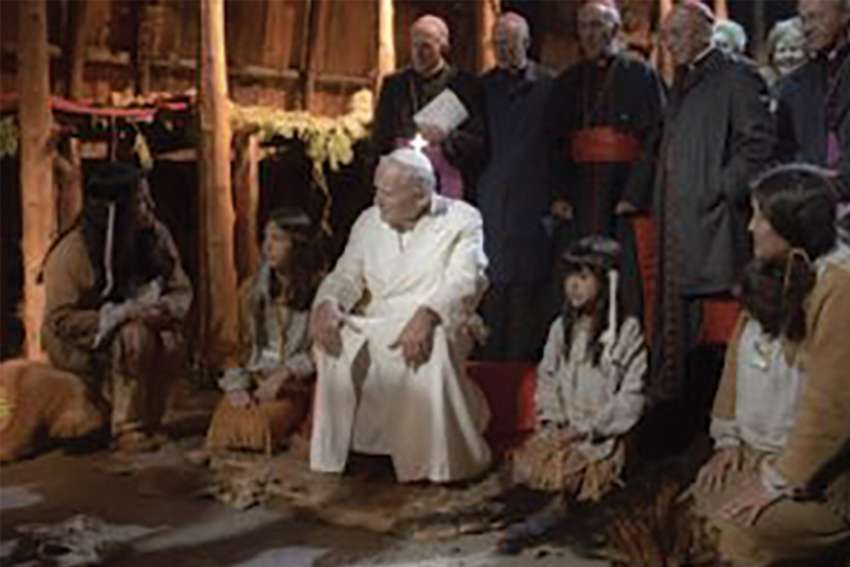Was the proclamation of Jesus Christ good for the Indigenous peoples of Canada? Was the Gospel good news for them? Were they — like all other peoples in history — marked by sin and its consequences, and therefore in need of salvation? Or were they, alone among the nations, exempt from original sin — a veritable race of the immaculately conceived?
The majority of Indigenous Canadians are Christian. They would not consider themselves exempt from the command of the Lord Jesus to baptize all nations. Indigenous Christians know they need Jesus Christ because they are sinners — like Europeans, Jews and Greeks, not to mention Parthians, Medes and Elamites; residents of Mesopotamia, Judea and Cappadocia, Pontus and Asia, Phrygia and Pamphylia, Egypt and the parts of Libya near Cyrene; visitors from Rome; Cretans and Arabs (cf. Acts 2).
Yet the view that Indigenous Canadians were a perpetually pure people living in a peaceable paradise has remarkable purchase in Canada’s elite opinion and is moving toward a mainstream consensus. Sin arrived in the Americas with the Europeans.
There is a cultural judgment behind that view, namely that Indigenous culture — in all its varieties — was superior to the Christian culture developed in the 15 centuries before the first Europeans made their way across the Atlantic. Therefore, the expansion of Christian European culture to the Americas was an offence against the Indigenous peoples and could only be sustained by force, and brutalizing force at that. It had to be, because no truly free Indigenous soul would choose the “inferior” Christian account of creation, fall, redemption, salvation and sanctification, over the “superior” Indigenous account of deities within nature itself.
While Christians today frequently lament the abuse and injustices that took place, especially by missionaries, the idea that Indigenous peoples would be better off without faith in Jesus Christ is not a view that any Christian can hold. Anyone who holds that view does not believe that Jesus Christ is God. Or believes that God came in the flesh for all peoples except the Indigenous peoples of the Americas.
“We recall how the worthy traditions of the Indian tribes were strengthened and enriched by the Gospel message,” said St. John Paul II when he met Indigenous Canadians at Martyrs’ Shrine in Midland in 1984. “These new Christians knew by instinct that the Gospel, far from destroying their authentic values and customs, had the power to purify and uplift the cultural heritage which they had received. During her long history, the Church herself has been constantly enriched by the new traditions which are added to her life and legacy.”
That Indigenous culture “enriches” the life of the Church is not controversial. What is contested is that the same culture needs to be “purified” of its malign elements, and that it can be “uplifted” by the patrimony of Christian culture.
A public event — like the swearing-in of a new government — that includes certain older Indigenous religious practices (smudging, for example) but excludes the Christian practices of the majority of Canada’s Indigenous people (the Lord’s Prayer, for example), expresses the view that the older culture is superior. On such an occasion, the government appears to be making a religious claim that is at odds with foundational Christian beliefs.
“Missionary evangelization is the primary service which the Church can render to every individual and to all humanity in the modern world,” wrote John Paul in his 1990 encyclical on evangelization, Redemptoris Missio (The Mission of the Redeemer).
The primary service the Church offers the Indigenous peoples of Canada remains the proclamation of the Gospel, no matter how many other worthy projects are pursued. Should the Church neglect this primary service in favour of other priorities, it is a judgment that Indigenous Canadians do not deserve the best of the what the Church has to offer, namely the fullness of revelation in Jesus Christ.
“Peoples everywhere, open the doors to Christ!” continues John Paul in Redemptoris Missio. “His Gospel in no way detracts from man’s freedom, from the respect that is owed to every culture and to whatever is good in each religion. By accepting Christ, you open yourselves to the definitive Word of God, to the One in whom God has made Himself fully known and has shown us the path to Himself.”
The challenge for Canada’s Catholic leadership — both clerical and lay — in working toward deeper reconciliation is to remember just that, that Jesus Christ, the Gospel, the sacraments and the Church are good news for Indigenous Canadians too.
(Fr. de Souza is the founding editor of Convivium and a pastor in the Archdiocese of Kingston.)


